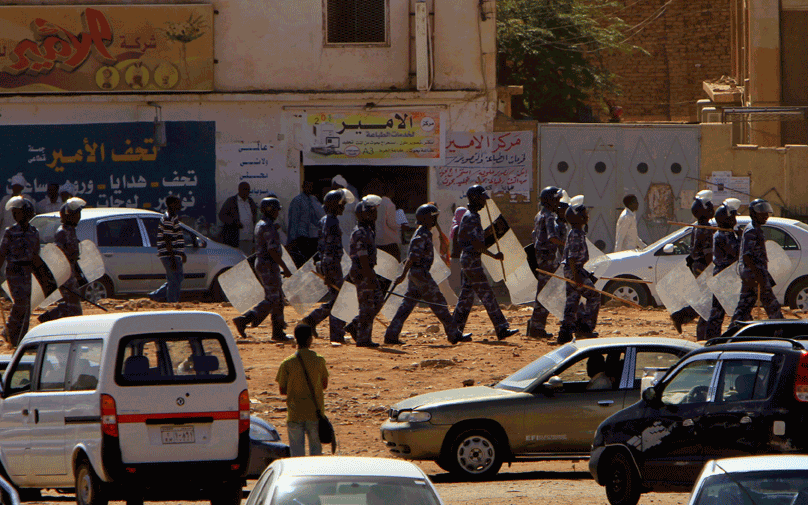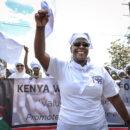North Sudan’s political economy and internal politics

This post is Part I of a longer article Making Sense of a Thorny Separation – Part II can be read here: Internal Dynamics of the South
In the Sudanese capital of Khartoum, the political environment seems to have hardened recently. Following years of economic growth, with some years reaching double digit growth figures[1], the situation has gotten more precarious. Facing the risk of losing the highly needed revenue from oil, of which an estimated 75% of the country’s reserves will go to the new republic of South Sudan[2], along with a sudden drop in foreign currency reserves, the government has initiated the placing of certain restrictions on the out flow of foreign currency[3]. This has been done by banning certain imports, and in order to strengthen state finances, also reducing state subsidies on certain vital commodities, such as sugar and fuel. These macroeconomic initiatives, probably more than the prospect of “losing the South”, has led to sporadic popular protests in several towns of Northern Sudan in the early part of the year.
These protests exacerbated and possibly inspired by the regional wind of change, and the momentum gained by neighbouring revolutions[4], were met with heavy handed riot police. These encounters have later been characterized as human right violations[5]. The significance of these protests have been judged differently by analysts and protesters[6], but it has to be kept in mind, that on two previous occasions popular revolts/intifadas have turned the tide of politics in Sudan, and this notion is very much alive in Sudanese folklore[7]. Hence this part of the history of Sudan, may explain both the momentum of some of the protests, as well as the heavy handed response. Furthermore, it demonstrates some of the difficulties that the economy is suffering from, and how this may contribute to the actions of President Bashir.
The real pressure on the Sudanese Government solely led by President Bashir’s National Congress Party (NCP) following their recognition of the referendum seems to come more from the politico, than from the population. From various moderate voices, trying to reach a diplomatic solution for the North through political measures, to hardliners more worried about sovereignty and self survival than political compromises. Recently these hardliners have chosen to be more confrontational, preferring a tougher stand against the SPLM in the South. A tougher stand including military display and engagement, as seen with the violent takeover of Abyei recently and the escalating fighting in South Kordofan State. President Bashir may initially have tried to satisfy both, but after receiving international recognition and the reopening of some diplomatic channels following his acceptance of the referendum result, he has slowly but safely opted for appeasing the hardliners. This, in true Sudanese fashion has sent various mixed signals that accumulatively, confuse rather than illuminate the status of Khartoum’s position.
True to tradition, he imprisoned the opposition figure and Muslim cleric Hasan al-Turabi, while at the same time promising to constitute Sudan’s new legal system on the principles of Sharia law. More surprisingly, Bashir went further and first sacked and then allegedly also imprisoned the former head of the national security apparatus and more recently presidential advisor for security affairs, Sala Gosh, who was said to be planning a coup d’etat against the Bashir regime[8]. These steps may in turn serve to consolidate the hardliners around Bashir, as indicated as early as 2010 following the elections[9]. Bashir also went as far as hinting that he would not seek to run for the next presidential elections, although these are likely to be at least four years away. Bashir has also been engaged in the traditional brinkmanship of Sudanese politics, not only towards the South, but also with other opposition parties, namely the Umma Party and its leader Sadiq al-Mhadi. Sadiq al-Mhadi who himself, by engaging in dialogue with Bashir, managed to jeopardize the fragile consensus among the opposition parties in Khartoum; a consensus established prior to the elections in April 2010 and resulted in the oppositions boycotting these elections.
In terms of foreign policy, the priorities of the NCP government have been to ensure that the new regimes coming into power in the region are kept on good terms. This in addition to maintaining the dialogue concerning the lifting of sanctions, while working on being taken off the famous US list of states sponsoring terrorism, following the NCP approval of the referendum result. The US and Sudan are both suspicious of the Muslim Brotherhood in Egypt possibly being part of a government in Cairo, albeit for different reasons. Khartoum knows that such turn of events will be likely to empower Hasan al-turabi only further, and so does the US state department. Hence a situation has arisen, where the realist recognition of common enemies somehow is pulling Khartoum and Washington closer together through necessity.
This may not provide much clarity as to the current conditions, but it exemplifies the character of Sudanese politics, where strategic alliances usually are short lived and there are no such thing as ideological alliances. One obvious pattern in all of this is of course another character of Sudanese politics; the brinkmanship, practiced internally (towards the opposition) and externally (towards the SPLM foremost), as highlighted in the controversial dialogue between Bashir and Sadiq al-Mahdi. Further support for this is found in the several agreements made with the SPLM, only to be abandoned later. However, compared to the recent developments in the South and in Darfur (both have witnessed a recent surge in military build-up and fighting), the fluctuating politics of Khartoum, indeed supports the influence of hard-line practice and rhetoric, as well as being indicative of an increased pressure emitted as a result of the politics in Khartoum. These aspects of the political economy in Khartoum and the increased pressure on the NCP establishment from various sources need to be kept in mind, when looking at the developments outside of Khartoum, in areas including Abyei, Kordofan, Southern Sudan and Darfur as well as in particular, when taking into consideration the political and economic interdependence between the North and South Sudan.
[1] R Cockett.:”Sudan: Darfur, Islamism and the World”. Yale University Press, New haven and London, 2010
[2] Associated Press: “South Sudan mulls new oil export routes”, Associated Press, 16 February 2011, Retrieved 4th May 2011 from European Coalition on Oil, news, Available from <http://www.ecosonline.org/news/2011/20110216_South_Sudan_mulls_new_oil_export_routes.docx/>
[3] Sudan Tribune: “Sudan’s Finance Minister defends austerity measures, says more to follow”. Sudan tribune, 7 January 2011, retrieved 30 April 2011, Available from <http://www.lib.unimelb.edu.au/cite/cambridge_politics/cam_pol_enews_t.html>
[4] Frequently referred to as The Arab Spring
[5] Human Rights Watch: “Violent response to Peaceful Protests”, Human rights Watch, 3 February 2011, Retrieved 9 February 2011, Available from < http://www.hrw.org/en/news/2011/02/03/sudan-violent-response-peaceful-protests>
[6] J Gettleman: “Young Sudanese Start Protest Movement”, 2 February 2011, retrieved 5 May 2011, available from < http://www.nytimes.com/2011/02/03/world/africa/03sudan.html>
[7] M Mamdani, “Saviours and survivors: Darfur, Politics and the War on Terror”. Pantheon Books, New York, 2009
[8] Though these allegations have not been confirmed
[9] Africa Confidential, “Crisis Cabinets”, Africa Confidential, Vol. 51, No. 13, 2010, P.8.








[…] The political economy in North Sudan and internal politics | African Arguments How will the North and its ruling elite develop after the secession of the South? It seems that it could face tough times. Jens Pedersen try to give you a better understanding of the situation. Wie werden sich der Norden und seine regierende Elite nach der Sezession des Südens entwickeln? Es scheint, dass ihnen harte Zeiten bevorstehen könnten. Jens Pedersen versucht, Ihnen ein besseres Verständnis der Situation zu vermitteln. […]